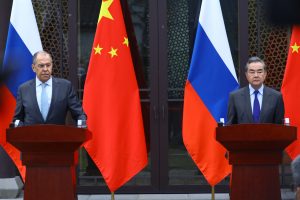Russian Foreign Minister Sergei Lavrov met with his Chinese counterpart Wang Yi in Guilin city in Guangxi Zhuang Autonomous Region in southern China. The two sides, both under a spate of fresh sanctions by the United States and European countries over human rights violations, called for a United Nations Security Council summit over what they see as intensified turbulent change, bullying, and meddling in domestic affairs. “Interference in a sovereign nation’s internal affairs under the excuse of ‘advancing democracy’ is unacceptable,” the two said in a joint statement.
Despite the Chinese Foreign Ministry refuting that there was any deliberate planning for the Lavrov’s two-day visit coming on the heels of what appeared to be a contentious first U.S.-China meeting under the Biden administration, it is impossible not to compare the drastically different tones communicated between the two country pairings. “For us, China is a true strategic partner and like-minded friend. Our cooperation in the international arena will have a stabilizing effect on the global and regional situation,” Lavrov told Chinese media on March 22. “We want the architecture of international relations to be fair, democratic, capable of ensuring stability,” Lavrov added the next day. Their joint statement emphasized the centrality of the United Nations to the international system and called on states to “adhere to the principles of open, equal, and non-ideological multilateralism.”
Beyond coordinated messaging hitting back at the United States and its Western partners, the two sides discussed the Iran nuclear deal, urging Washington to unconditionally return and Tehran to resume compliance. They also spoke about Afghan reconciliation and reconstruction; the situation in Myanmar following the coup; as well as U.N. reform, climate change, Syria, and Sudan. In the Chinese Foreign Ministry press conference on March 23, spokesperson Hua Chunying said, “The more unstable the world is, the more China and Russia need to advance our cooperation.”
Sino-Russian cooperation appears poised to expand further as officials continue to present the friendship as ever-stronger and closer. Russia was reportedly the most visited country by high-level Chinese delegations in 2020 despite the global pandemic, with Wang and Lavrov having eight phone calls and two meetings last year. This year also marks the 20th anniversary of the signing by China’s Jiang Zemin and Russia’s Vladimir Putin of the Treaty of Good-Neighborliness and Friendly Cooperation between Russia and China, an agreement that facilitated the expansion of the scope of cooperation between the two neighbors.
Separately, this latest visit comes following the joint announcement by Chinese and Russian space administrations of their first collaborative space project to construct a lunar research station – the International Lunar Research Station (ILRS) – earlier this month. The MoU for space cooperation called for developing “a comprehensive scientific experiment base with the capability of long-term autonomous operation, built on the lunar surface and/or on the lunar orbit.” Although no timeline was provided, the two said the lunar base would be “open to all interested countries and international partners.” Elsewhere, China and Russia also appear to be pushing aside differences and aligning themselves more in the Arctic.
Although Beijing and Moscow both benefit from the performative dimensions of pushing back against Washington, it is unclear how broad the two-way relationship will go. As Natasha Kuhrt and Marcin Kaczmarski highlight, while the two share a common antipathy to Western pressure, both are keen to preserve maneuvering room in the conduct of their respective policies.
That said, added pressure from not only from the United States, but other Western partners, may serve as the impetus for deepening the Sino-Russian strategic partnership. “The policies of the Biden administration which are based on the notion of China as the principal challenger to the US’ global dominance, and of Russia as a major threat to the US-led world order, have made it imperative for Moscow and Beijing to work together even more closely on geopolitical, geo-economic and security issues,” writes Carnegie Moscow Center Director Dmitri Trenin in an op-ed in China Daily.













